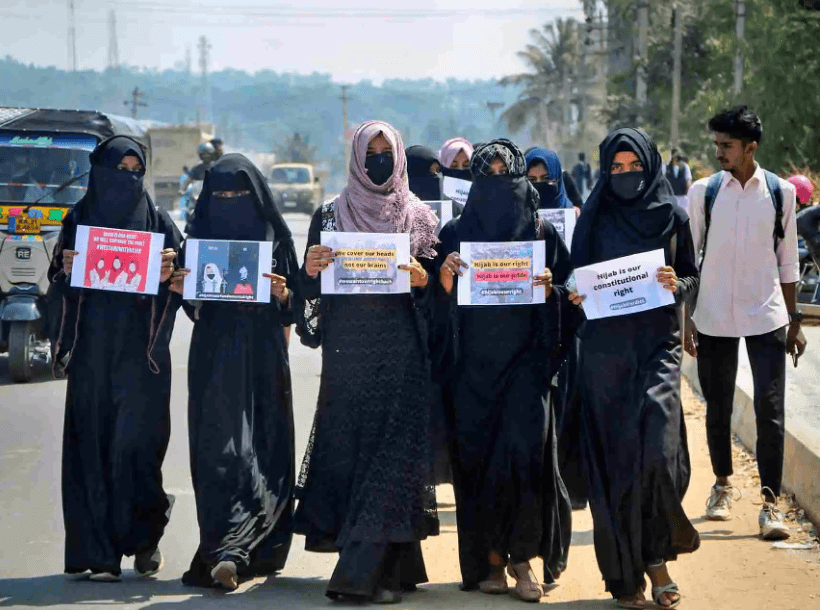The Indian Supreme Court (SC) on Thursday delivered a split verdict on the validity of Karnataka’s controversial hijab ban in educational institutions and referred the case to a larger bench. The two-judge bench gave contrasting views on the issue, particularly regarding the conflict between freedom and discipline.
Justice Hemant Gupta dismissed appeals against the Karnataka government’s order to ban the hijab from classrooms and agreed with the Karnataka High Court (HC) decision allowing the state to enforce the ban. Justice Gupta remarked that “symbols of religious beliefs cannot be worn to secular schools maintained from state funds,” going on to say that “securalism is applicable to all citizens; therefore, permitting one community to wear their religious symbols would be the antithesis to secularism.”
He also said state-run schools have a right to enforce uniforms, as it brings “parity among students” and “promotes uniformity and encourages a secular environment in the schools.” He noted that these rules help foster an atmosphere of discipline in schools and emphasised that defiance of these rules “would be an antithesis of discipline which cannot be accepted from the students who are yet to attain adulthood.”
When Dhulia J says "discipline, but not at the cost of freedom and dignity", he's breaking from encrusted judicial tradition.
— Gautam Bhatia (@gautambhatia88) October 13, 2022
This is why, whatever happens in the future, this judgment will be long-remembered. It's one for the ages.
In this respect, Justice Gupta asserted that adding or subtracting from a uniform would ultimately erode discipline among students. “Once the uniform is prescribed, all students are bound to follow the uniform so prescribed. The uniform is to assimilate the students without any distinction of rich or poor, irrespective of caste, creed faith […] and to cultivate a secular outlook,” he said. To this end, he said wearing the hijab in schools should not be permitted, but students can wear it outside of schools.
Justice Sudhanshu Dhulia, however, disagreed with Justice Gupta’s reading of the issue. He said that while discipline is essential, it should not come at the cost of freedom and dignity, adding that wearing the hijab is “ultimately a matter of choice, nothing more, nothing less.” Justice Dhulia argued that secularism entails the promotion of diversity. “Schools are not required to have the discipline and regimentation of a military camp,” he asserted, referring to the Karnataka HC’s decision comparing schools with military institutes.
“Asking girls to take off their hijab before they enter the school gates, is first, an invasion of the privacy, then it is an attack on their dignity, and then ultimately it is a denial to them of secular education,” he remarked. Justice Dhulia opined that one of India’s greatest achievements has been the improving access to education for girls, noting that for many Muslim girls from conservative families, “her hijab is her ticket to education.”
Hijab should be a matter of choice - Whether it is Iran or India.
— Ashok Swain (@ashoswai) October 13, 2022
Accordingly, he asked, “Are we making the life of a girl child any better by denying her education, merely because she wears a hijab? All the petitioners want to wear is a hijab! Is it too much to ask in a democracy? How is it against public order, morality, or health or even decency?”
The row over wearing the hijab emerged in January, after an educational institution in Udupi banned hijabs on its premises. More schools subsequently issued similar orders. Then, in February, the Karnataka government passed an order mandating uniforms in educational institutions and banning symbols that “disturb equality, integrity, and public order.”
Several Muslim women and rights activists gathered outside educational institutions to protest the decisions, many of whom approached the state’s High Court, claiming that the principles of freedom of religion enshrined in the constitution give them the right to wear hijabs.
Our #50WordEdit SC’s split hijab verdict pic.twitter.com/XeuI4FBaEc
— Shekhar Gupta (@ShekharGupta) October 13, 2022
However, on 15 March, the Karnataka HC handed down a verdict upholding the state government’s order, saying the hijab is not an intrinsic part of Islam. Following the decision, petitioners said they would appeal the matter before the SC.
In light of the split verdict, the bench referred the case to the Chief Justice of India, who will constitute a larger bench for re-hearing the case.

